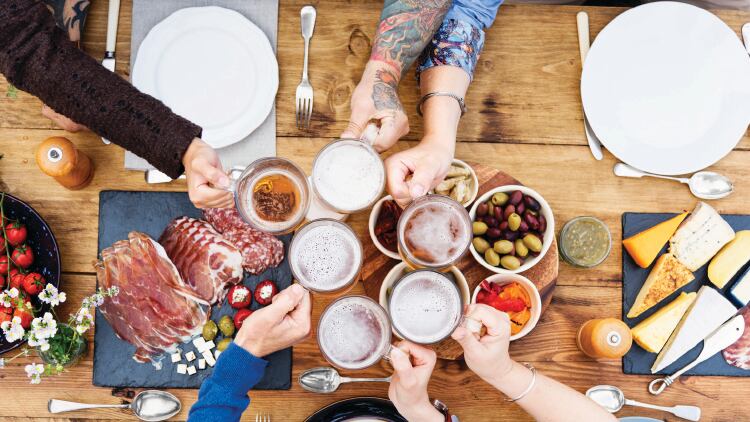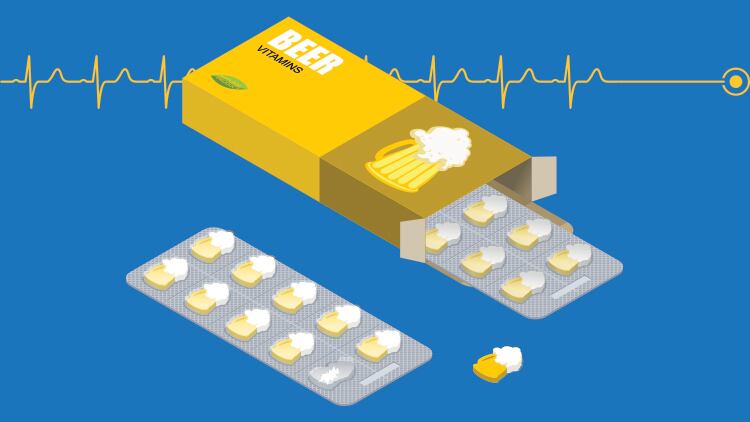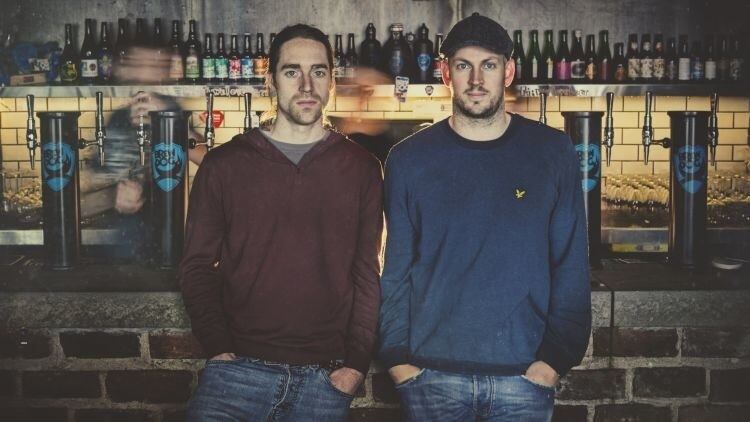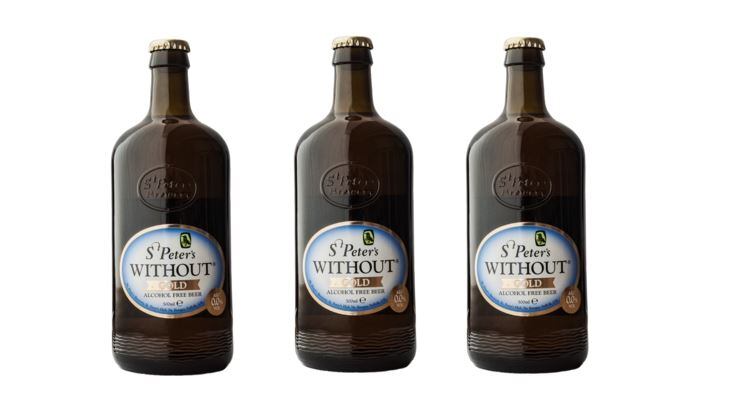There has been a lot of noise around low and no-alcohol beer in recent months, and with good reason. The number of products with 0.5% ABV alcohol or less has soared over the past year, and the quality and variety has undoubtedly improved across the board.
These products are a blessing for drinkers who don’t consume alcohol, or those who are pregnant or driving. They’re also often seen as the go-to option for those looking for a healthier alternative to full-strength beer.
However, because of the different production methods used in some no-alcohol beers, the sugar and carbohydrate levels are often higher than in their full-alcohol counterparts. So, with that in mind, does this make these products unhealthy, and should health-conscious drinkers be looking at other alternatives?
Firstly, it’s important to note that, although the carbohydrate and sugar content of low-alcohol beers may be higher than their full alcoholic equivalents, this doesn’t necessarily mean they are less healthy; in fact the overall calorie content of low-alcohol beers is often lower in total.
“Alcohol typically contains 7kcal of sugar per gram and 4kcal carbohydrates per gram,” explains Sonal Shah, director of Synergy Nutrition and Nutritionist Resource member. “If you are watching your weight and want a trimmer waistline, lower-alcohol beverages are a better option, as they are lower in calories.”
Weighing up the pros and cons
Secondly, it is also important to note that not all low-alcohol products are the same. Brewers use different methods to produce their low or no-alcohol products, hence variety in terms of the nutritional information of these products. Heineken 0.0 Lager, for example, contains 4.8g of carbohydrates per 100ml (of which 1.3g are sugars), while Infinite Session Pale (0.5% ABV) has 3.3g of carbohydrates and 2.9g of sugars.
“Alcohol-free beers do have a lot less calories than their alcoholic counterparts and I think that is pretty undeniable,” states Chris Hannaway, co-founder of Infinite Session. “However, there is a pretty broad spectrum of products available. Our beer is 11 calories per 100ml, whereas you can get alcohol-free beers with over 40 or 50 calories per 100ml.
“People are brewing to different recipes and different styles, so I think to say that they are all the same from a health perspective is a bit of a generalisation.”
Thirdly, excessive alcohol consumption can also have further negative effects that may result in the consumer being less healthy during and after heavy drinking sessions.
“In many individuals, alcohol stimulates the appetite by releasing insulin, which causes blood sugar levels to drop,” adds Shah. “Additionally alcohol’s diuretic effects leads to increasing urination, thus decreasing electrolytes like sodium, leading one to crave salty foods and carbohydrates like chips and crisps!”
“Sleep deprivation induced by alcohol and late nights can lead to feeling demotivated and perhaps functioning a bit slower than usual the next day. Especially if nursing a hangover.”
Hence, stating that low-alcohol products are less healthy than full-strength products purely on account of higher sugar and carbohydrate content is clearly missing the bigger picture. Indeed, alcohol’s negative health effects, especially if consumed in excess, can include: impaired liver function, poor brain health, and effects on mood, digestion and sleep quality.
However, for those drinking responsibly, it doesn’t necessarily mean that alcohol need be avoided completely in order live a healthier lifestyle. Tom Bell and Gary Conway created SkinnyBrands in 2015 with the goal of developing an innovative alternative in the alcohol market that did not reduce the alcohol percentage, but would reduce calories, through reductions in carbohydrates and sugars.
Health in alcoholic beverages
After seeing a lack of innovation in this sector of the market, they decided to step into it and developed Skinny Lager, which is a 4% ABV beer that’s gluten-free as well as being low in cal-ories, sugars and carbohydrates.
Skinny lager was launched in October 2016, and is now available in more than 2,000 pubs, bars, restaurants and hotels in the UK, most major supermarkets and six international markets.
“There is a distinct lack of innovation in the sector and only a small amount of products fit the bill, despite a rapidly growing trend across both the health and wellness sector and the food and drink industry,” Bell explains.
“From yoghurts to biscuits to ready meals, there are low-fat, low-carb, low-sugar and gluten-free options, but the only innovation coming out of the alcohol sector at the moment is towards 0% products.”
Bell has no issue with alcohol-free beer per se, but argues that the explosion of and interest in these products is born of a misunderstanding of what many consumers actually want from drinks products.
“The rise of 0% products, and innovation within that specific part of the sector, has been brilliant,” he says. “But retailers are giving more shelf and fridge space to these products when I cannot find one piece of relevant information to suggest that is what consumers are looking for.
“Consumers are buying this product because there isn’t an alternative. There is either a full-strength, full-fat and full-calorie product, or a 0% product. There is nothing in the middle that has lower sugar, carbs and calories, but still contains alcohol.
“The problem is that retailers are giving more space to 0% because they are being told that this is the ‘healthier’ alternative,” he continues. “I feel like they are misunderstanding what consumers are asking for, and they are misunderstanding what the implication of a 0% product is.
“When you look at the sugars and the carbohydrate content of these products, you will see that they are not a healthier alternative. Very often they have a higher sugar and higher carbohydrate content than their full-alcohol counterparts.”
However, not everyone agrees that consumers are turning to alcohol-free because they are counting carbs, sugars and calories. Hannaway states that many of Infinite Session’s consumers choose it because they are trying to regulate their alcohol consumption, rather than because they are dieting or following a strict fitness regime.
“From our perspective, consumers aren’t necessarily trying to shave a gram or two of carbs or sugars when they are switching to alcohol-free,” he says. “They are looking to cut their alcohol intake just like they might be looking to cut their meat or dairy intake.
“Consumers are far more concerned about being able to wake up the next morning without the hangover than they are about how many calories are in our beer. We actually get quite a lot of pleasantly surprised consumers when they find out how few calories there are in our product.
“There isn’t an expectation that it is going to be less sugar or calories and I think the sugar or calorie content of low-alcohol beer is a myth that needs to be busted.”
In response, Bell cites Nielsen reports showing that Millennials are seeking products with reduced calories. “Millennials look for value but they also rate health factors such as low carb, calories, vitamin-fortified and organic as very important; compared to Boomers who favour value and price, particularly when purchasing beer and cider.”

People want to drink alcohol
In addition, they are 55% more likely to have consumed vodka. “There is more alcohol in spirits than there is in beer,” he states. “So this suggests that Millennials are not looking for a 0% or reduced-alcohol content product. People are consuming alcohol because they want to consume alcohol. They are reducing their consumption not because of the alcohol, but because of the carbs, sugar and calories behind it.”
Responding to concerns over the negative effect of excessive alcohol consumption on physical and mental health, Bell points towards the Chief Medical Officer’s guidelines and stresses the importance of
responsible consumption.
“The guidance that the Government issues is backed up by empirical research,” he says. “Alcohol, when consumed in line with the daily recommendations, is not a problem. The carbs, the sugars and calories that go behind that product is a problem from a health perspective, and that is what the market is currently failing to address.
“All we are doing is saying you should drink responsibly. We aren’t saying that because our product has less calories in it you should drink twice as much!”
Call for transparency
One topic that both alcohol-free and full-alcohol health-targeted beer brands are in agreement over, is the need for greater transparency across the sector.
“There is no guidance to say that alcohol products should contain nutritional tables,” explains Bell. “I cannot fathom why a bottle of water with fewer than five calories in it needs to have a table on the back but a bottle of beer with north of 200 calories doesn’t.
“The lack of innovation by some of the big players stems from them not wanting consumers to know how many calories are in their products. As soon as consumers realise that, there is going to be a shift towards healthier alternatives.”
“More transparency across the sector would be good because people very often don’t know what is in their beer,” adds Hannaway. “Clearly displayed nutritional information, such as that on all our products, would allow the consumer to make a more informed choice.”
Ultimately, beer is never going to be a healthy drink because the calories contained within it have little nutritional value. However, with the range now available in the market, either for those looking to cut back on their alcohol consumption, or their calorie, sugar and carbohydrate content, there are ‘feel-good’ alternatives to satisfy the growing number of health-conscious consumers.




